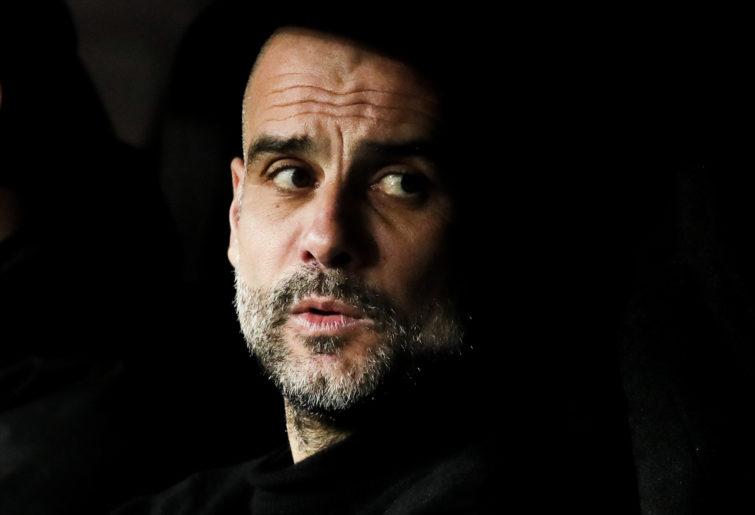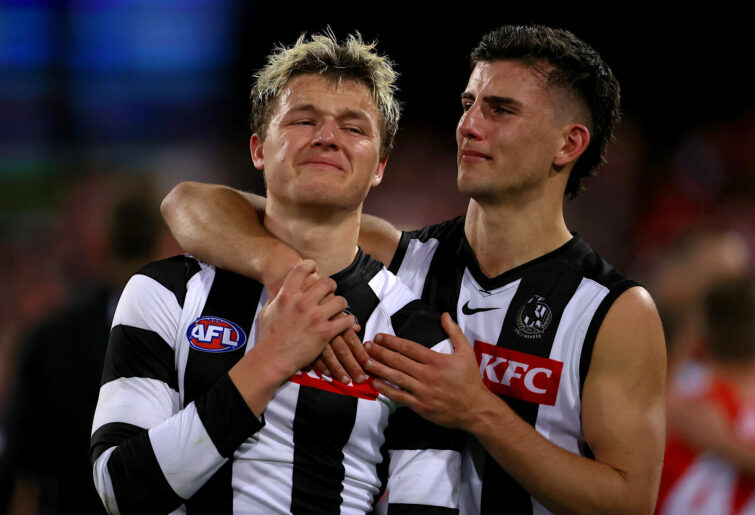As I was writing this I realised that epic sporting losses, which was my starting point, perhaps cannot compare to a club’s symbolism in the social and political arenas that can be found in countries with more corrupt histories than Australia.
In purely sporting terms Collingwood is No.1, but when you bring race, politics, and the uprising of the worldwide proletariat into the equation, things get fuzzy. Like everything else, it all depends on how you want to frame the question.
9. Los Angeles Lakers
Just as the grim Yankees are a stand-in for the merciless New York City itself, so do the bright yellow Lakers represent the fun and occasional vacuousness of the City of Angels.
Perhaps more than any other sporting club, certainly in America, the Lakers can be summarised with a simple listing of their historic stars: Wilt Chamberlain, who like the city itself legendarily had the skills and glam but could not match Bill Russell’s stern, winning focus. Kareem Abdul-Jabbar, Magic Johnson, Shaquille O’Neal, he who shall not be named, and now at least for one dodgy hub-championship, LeBron James.
8. Liverpool FC
To be honest Liverpool had slipped my mind until describing Man United’s tragedy. I then realised I had to include Liverpool’s 30-plus-year fight for justice against the British establishment resulting from the 1989 Hillsborough disaster, in which 96 fans were killed, including future captain Steven Gerrard’s young cousin.
Liverpool fans, however, were also a main cause of the 1985 Heysel disaster, which is a black mark for the club.
7. Manchester United FC
In 1958 most of Manchester United’s team was killed in a plane crash. In 1968, coached and captained by two of the crash’s survivors, Matt Busby and Bobby Charlton, the team won the first European Cup by an English club in an epic extra-time final at Wembley.
This story is moving, full-circle and makes Man United basically unbeatable in English football folklore. Alex Ferguson’s storied, iron 27-year reign – a virtual impossibility in our results-now modern times – adds to this.

(Photo by Mike Owen/Getty Images)
6. Real Madrid CF
Everything I said about the Yankees could more or less double for Real Madrid, including how much I dislike them. For the history-changing acquisition of Babe Ruth from their direct rivals, read Alfredo di Stefano. For the symbolic representation of American power, read Francoist power.
Once again: is pure winning interesting? In Real Madrid’s case, yes, unlike the Yankees. Real’s 2022 Champions League triumph, in which their blatantly inferior team staged three consecutive from-the-dead comebacks, has caused me to re-evaluate every single historical Merengue triumph of the past.
What I previously thought of as wretchedly good luck on the day against, say, Bayer Leverkusen and Atletico Madrid, or their entire 2018 Champions League campaign, I now see as Real Madrid being supernaturally, ethereally unbeatable – regardless of how good their play actually is, or isn’t.
A Robert Johnson-like deal with the devil at a midnight crossroads? Who knows, but they are 8-0 in modern Champions League finals.
Unlike Barcelona, who I have usually preferred, Real aren’t holier-than-thou, they don’t pretend to be what they’re not, and they don’t need to be the best in order to keep persevering. I’m starting to come around to why people may like them. (Damn fascists!)
5. New York Yankees
Once again Seinfeld provides the executive summary in one easy line: “Ruth… Gehrig… DiMaggio… Mantle… Costanza?” Replace Costanza with Jeter and you cover 90 years of winning in five names.
The Yankees, at least in the 20th century, were the inverse of the Red Sox. Is consistent winning interesting? In sporting terms, not precisely in their case: winning was a business to them, without much sentiment – think Hawthorn.
In fact, like Collingwood, most of the interest that the Yankees brought was in the few key games they unexpectedly blew in 1955, 1960 and 2001, and like the Melbourne Demons in their epic, generational fall from 1965 onwards.
With access to the best pitchers and best home-run hitters winning matches for the Yankees singlehandedly, money talked louder than the teamwork and patient building of other teams both in the 1950s and the 1990s. God I hated them. I hated the last-play, undeserving victories, the hanger-on celebrities wearing their stupid hat, the occasionally arrogant but joyless players.
The Yankees, with their powerful navy-blue NY badge, were the physical embodiment of the concept of winning and the symbol of America itself: a team, a city and a country that accepted no excuses and got s–t done.
Even the nickname itself, though not because of baseball, became a derogatory, political term among both Southern Americans and Latin Americans in other countries to describe the gravitational centre of political power that is east coast America.
The Simpsons labelled both the club and the nation with the line: “Powerful and respected until the year 2000.” In reality the precise year in both cases was 2001, but that probably hits too close to the bone.
Owner George Steinbrenner was bombastic but without him the Yankees, much like perhaps Carlton and Essendon, have lost some home-grown identity and character. Despite their cash, they have won only one of the last 21 MLB titles, and the 2010s was their first World Series-less decade since the 1910s.
4. FC Barcelona
From here the rankings get tougher. I’ll go with Barcelona here, who rightly or wrongly have been paraded as a symbol of resistance to oppressive governmental control, based on Spain’s painful history of both their Civil War and the Franco dictatorship, when minority languages could only be spoken in public in the stands of Barcelona and Athletic Bilbao football matches.
Arguably Athletic are the more symbolic club, who maintain an all-Basque playing list to this day and yet have never been relegated from Spain’s top division. But Barça have marketed themselves better.
Barça contributed an unforgettable leaf to their story from 2008-12 to enhance their legend. The club raised from infancy the collection of players that consisted all of: the most iconic club team, the most iconic and decorated national team, the most unforgettable player (Leo Messi), the most unforgettable playing style, and the most iconic manager (Pep Guardiola) of modern times.

(Photo by David S. Bustamante/Soccrates/Getty Images)
Which other club is (was) “More than a club”?
3. Brazil national football team
Brazil is the record-holder of World Cup titles and the only country to participate in all 22 of them. You can basically list an unbroken chain of Brazilian heroes, summing up an entire century in flamboyant one-name jumps. Arthur Friedenreich, Leonidas, Zizinho, Pele, Garrincha, Jairzinho, Socrates, Romario, Ronaldo, Ronaldinho.
What’s not to love about Brazil? Who hasn’t dreamed of having sex in a golden yellow shirt while nonchalantly dribbling around their marker, scoring a hat-trick and cleaning up multiple World Cup trophies on the sands of Copacabana in their spare time?
In contrast to the Brazilian nation’s painful history of slavery and racial exclusion, the Seleção was one of the first worldwide arenas in sport for black players to show what they could do. Brazil in fact only became world beaters when Black players like Leonidas and Pele were given the team’s principal responsibilities.
From 1958-1970 and then from 1994 to approximately 2009, Brazil was an unceasing parade of winning, joy and charisma. But two tragic losses at home World Cups have unexpectedly either added to or subtracted from the story: the most famous home sporting defeat of all time, a 1-2 reversal to Uruguay in the 1950 World Cup final in front of 200,000 desperate fans, the largest crowd in world sporting history; and the 1-7 loss to Germany in 2014.
2. Boston Red Sox
The Red Sox, who won five of the first 15 American baseball championships, in 1919 sold one of the most famous sportsmen in history, Babe Ruth, and historically sank like a stone. The team they sold him to, the New York Yankees (see above), immediately rose like a phoenix.
But it’s one thing to just lose. The Red Sox lost with style. After 70 years, the Sox had a 99 per cent chance of winning the 1986 title, up two runs with two outs and no New York Met on base.
Three hits, one missed pitch by the catcher and one soft hit that trickled through a fielder’s legs later, and… Seinfeld even devoted an entire episode to this game, although from a New Yorker’s joyful perspective. I suspect most of the rest of the country was horrified.
The Sox support was fanatical, full of fans who hoped to see it finally happen if only once before they died. Another epic, seemingly generational choke occurred in 2003 to the hated New York Yankees, before the Sox unexpectedly re-wrote 100 years of history against the Yankees only one year later.
Up 3-0 in the same best-of-seven series 365 days later (the semi-final equivalent; it’s impossible for them to meet in the World Series), and one inning away from sealing a 4-0 clean sweep, the Yankees did a Red Sox, leaked the tying run and lost four consecutive knockout games to Boston, which to this day remains unprecedented and unrepeated in baseball history.
The Red Sox then won their first championship in 86 years.
The 21st century is certainly a different creature to the 20th. Here the Red Sox story more or less ends, as they have now won titles in 2004, 2007, 2013 and 2018 in somewhat mundane fashion. They’ve also beaten the Yankees in their last three playoff match-ups.
1. Collingwood Magpies
At first I believed the Red Sox’s sporting folklore was unbeatable, but the more I thought about it the more the Magpies trump them. This club was formed from the slums of Melbourne and represented people from some of the most difficult social situations in our city, inspiring a rabid, fanatical following (and its backlash among non-Magpie fans).
Collingwood immediately found success, including the greatest championship streak in the league’s history. Then the pendulum swung, and so began their supernaturally cursed era.

(Photo by Mark Kolbe/AFL Photos/via Getty Images)
The sheer number of ways in which Collingwood faithful have had to swallow narrow grand final defeats from 1960 to the current day is statistically impossible.
An obscure backman scoring the only goal of his later career in 1964. A wobbly behind in 1966. The greatest leaked lead in finals history in 1970. Dom Sheed nailing a one-in-five shot in 2018. These are only the starting point.
Unlike Carlton and Essendon, who lost their unique identities in the 21st century, the Collingwood rollercoaster continues into the current day. It is the story of a bombastic club that can’t get out of its own way, who can play the inspired underdog and the chokey favourite in equal measure. The inspired winning streak of 2022 and the forlorn feeling of their unlucky elimination this week only adds to their allure.
Collingwood, who paid their players equally until 1969 and who controversially had no players in the VFL Team of the Century, have had their famous names but generally the club, the supporters and the colours themselves have been the star.
The story of the VFL and AFL is almost interchangeable from the story of the Pies themselves. For better or worse, they’ve been there for the two modern tied grand finals, as well many moments of the game’s difficult history of fan racism.
There is only one caveat: outside of Victoria, Australia, who really cares?
Ultimately this brainstorm is not comprehensive. I know nothing about rugby, for instance, and there could possibly be additions from Italy, America or South America. I am open to suggestions!































































































